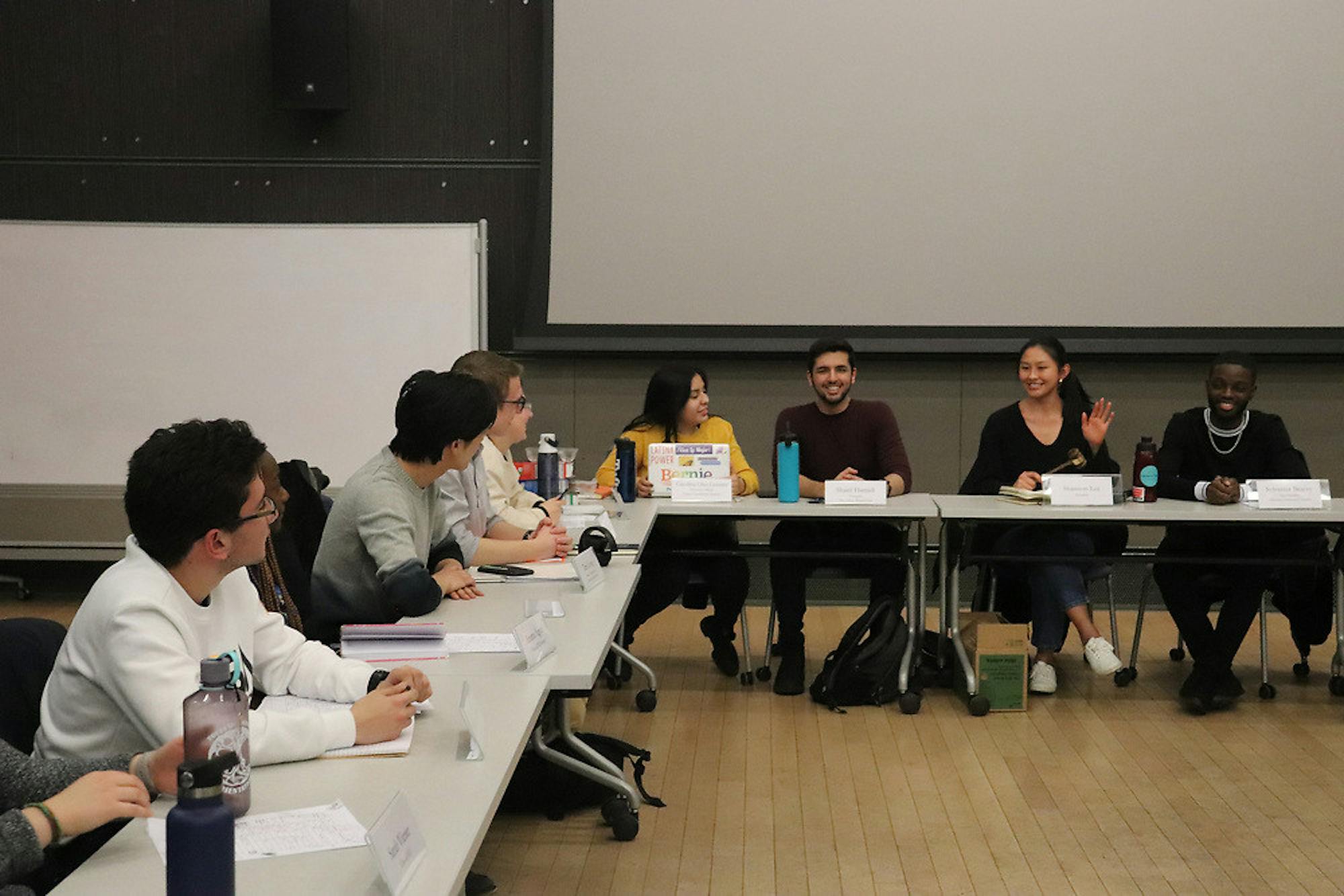The Tufts Community Union (TCU) Senateelected a new chairperson for its Administration and Policy (A&P) Committee and approved supplementary funding requests from seven student organizations at its meeting on Monday night in the Sophia Gordon Multipurpose Room.
Former Diversity Officer Grant Gebetsbergerwon the election, besting TCU Senator Ibrahim AlMuasher to fill the vacancy left by TCU Senator for the Class of 2022 Deepen Goradia's resignation as A&P Chair.
Election Commission Historian Mark Lannigan,a first-year, presided over the election, which was conducted by secret ballot.
AlMuasher, a first-year, explained that he accepted his nomination for the role because he believes that no TCU Senate election should be uncontested.
Gebetsberger, a junior, explained that his experience on the A&P Committee in the past will help him lead the committee this semester.
“Knowing how to work with admin and having done that in the past [is beneficial],” Gebetsberger said.
Gebetsberger said that one of his main priorities as A&P chair is to increase housing options available to students. He acknowledged the growing housing crisis on campus and argued that he would push the administration to alleviate that issue.
“A lot of [my job as A&P Chair] is housing advocacy, especially as we face a really horrible housing crisis,” Gebetsberger said. “Even if we don’t see new dorms built by the end of this year, pushing the administration to make sure that they know that we are very stressed about the housing issue and this is not something that’s going to go away for them or for us.”
In response to a question regarding supporting members of the A&P Committee,Gebetsberger said that he would hold himself responsible for progress as chairperson of the committee, in addition to the members of the committee.
“The way I like to tackle leadership opportunities is by both taking accountability on myself in my role as a leader but also holding everyone else accountable,” Gebetsberger said. “A lot of A&P’s work is very strenuous, slow-burning and does not give you that quick satisfaction, and therefore I think a very big part of it will be continuously motivating all the members of the committee and trying to give them hope and celebrating the smaller victories.”
Following the election, TCU President Shannon Lee announced that Maren Greathouse, the Medford and Fenway campuses' new associate director for diversity and inclusion education, would be conducting diversity consultations with the various faculty departments in the fall.
“That is a move because of suggestions from you all — from Senate — to increase diversity training among faculty,” Lee, a senior, said.
TCU Treasurer Sharif Hamidi then led the body in reviewing supplementary funding requests. Hamidi, a junior, explained how such supplementary funding works.
“All the money that Tufts undergrads pay through the student activities fee gets put into a central pool,” Hamidi said. “The remainder of that money that doesn’t get immediately allocated in annual budgets is kept in a supplementary fund, which is used to pay for unforeseen expenses or speakers, off-campus trips or on-campus events that are impractical to plan out during budgeting season.”
TCU Senate heard eight supplementary funding requests from seven separate organizations. Each supplementary funding request passed with little debate.
The Association of Latin American Studentsrequested $700 to pay for performers and a photographer at itsculture show on March 7. The request passed the TCU Senate in full by acclamation.
Sino-U.S. Relations Group Engagement (SURGE) submitted two separate requests for guest speakers to attend the SURGE Conference on April 10 and 11.SURGE requested $1,721 for flights and a hotel for their first speaker, Ying Zhu, and $735 for their second speaker, Matthew Goodman. Both requests were approved by the TCU Senate.
Tufts Labor Coalition requested $1,500 to host a workshop with the Boston Mobilization Team, which was approved in full by the TCU Senate.
The Vietnamese Students Club originally requested $1,918 to attend a conference in Danvers, Mass., from March 27 to 29, though the Allocations Board (ALBO) only recommended $603.
After briefly debating whether to fund transportation for the students from Tufts to Danvers for each day of the conference or simply pay for a hotel in Danvers, TCU Senate settled on funding a hotel stay for the group. TCU Senate passed the ALBO-recommended sum of $603 by acclamation.
Tufts Hillel requested $250 to host a speaker, Betsy More, on Feb. 18, which was approved in full by the TCU Senate.
The Entrepreneurship Association at Tufts requested $6,852 for subscriptions and to attend a conference in Austin, Texas, from March 14 to 16.TCU Senate passed the ALBO-recommended sum of $5,249 with 27 senators in favor, none opposed and one abstaining. The single abstention was made by a senator who is also a member of the Entrepreneurship Association.
TEDxTufts requested $4,950 for a professional videographyteam to film the TEDx event on March 8, which was passed by the TCU Senate with 27 senators in favor and none opposed.
After the hearings for supplementary funding requests concluded, TCU Parliamentarian and Senator for the Class of 2020 Finn McGarghan announced an abstract for a new resolution from the Education Committeecalling on Tufts' academic departments to publish course syllabi on their departmental websites and in the Tisch Library Archives.
“The resolution is trying to get the Tufts departments and faculty to publish their syllabi prior to course registration on the [Tisch] Library Archives or their departmental website for students to have access to them to know what they’re registering for,” AlMuasher, a member of the Education Committee, said. “[This will] make it easier for students, especially first-years and students with less knowledge of what classes are like to choose their classes.”
Robert Kaplan contributed reporting to this article.
TCU Senate elects new committee chair, hears supplementary funding requests

Tufts Community Union Senate holds its regular meeting in the Sophia Gordon Multipurpose Room on Feb. 9.





